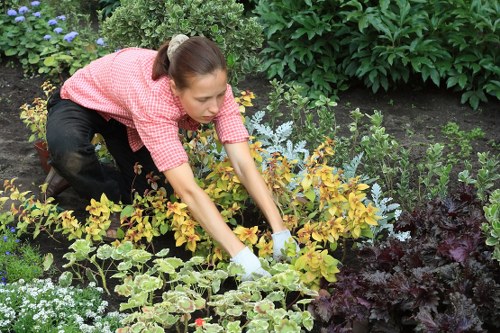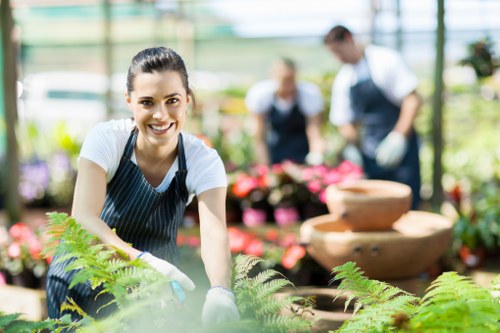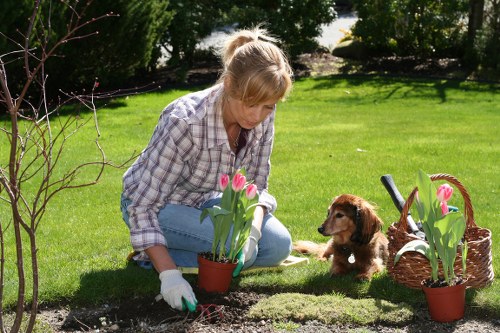Garden Maintenance in Blackwall
Introduction to Garden Maintenance

Maintaining a beautiful garden in Blackwall requires dedication, knowledge, and the right tools. Whether you're a seasoned gardener or a novice, understanding the nuances of garden upkeep can transform your outdoor space into a vibrant and thriving sanctuary.
Blackwall's unique climate and soil conditions present both challenges and opportunities for gardeners. By leveraging local expertise and adopting best practices, you can ensure your garden flourishes year-round.
In this comprehensive guide, we'll explore essential garden maintenance tips, seasonal tasks, and professional services available in Blackwall to help you achieve a stunning garden.
Understanding Blackwall's Climate

Blackwall experiences a temperate maritime climate, characterized by mild winters and cool summers. This climate is conducive to a wide variety of plants, but it also requires specific maintenance strategies to address issues like excessive rainfall and occasional frost.
The average annual rainfall in Blackwall is around 650mm, which influences planting schedules and irrigation practices. Gardeners must be prepared to manage water drainage effectively to prevent root diseases and soil erosion.
Additionally, understanding the frost dates in Blackwall is crucial for planting sensitive species. By aligning your gardening activities with the local climate patterns, you can enhance plant health and vitality.
Essential Garden Maintenance Practices

Regular garden maintenance involves a series of tasks that ensure plants remain healthy and landscapes look their best. Key practices include:
- Weeding: Removing unwanted plants to reduce competition for nutrients and water.
- Pruning: Trimming overgrown branches to promote healthy growth and improve plant shape.
- Watering: Providing adequate hydration, especially during dry spells, while avoiding overwatering.
- Fertilizing: Supplying essential nutrients to support plant growth and bloom.
- Pest Control: Identifying and managing pests to prevent damage to plants.
Implementing these practices consistently can significantly enhance the appearance and health of your garden.
Seasonal Garden Care

Each season brings its own set of gardening tasks. Adapting your maintenance routine to the changing seasons ensures year-round garden vitality:
- Spring: Focus on planting new growth, fertilizing, and pruning deciduous trees.
- Summer: Emphasize regular watering, weeding, and pest management.
- Autumn: Prepare for winter by clearing fallen leaves, mulching, and planting perennials.
- Winter: Protect plants from frost, plan for the upcoming year, and perform necessary tool maintenance.
Understanding and responding to seasonal changes is key to a resilient and thriving garden.
Choosing the Right Plants for Blackwall

Selecting plants that are well-suited to Blackwall's climate and soil conditions can reduce maintenance efforts and improve garden success. Consider native species and those known to thrive in similar environments.
Popular Choices:
- Roses: Hardy and versatile, suitable for various garden styles.
- Lavender: Drought-tolerant and fragrant, ideal for borders and herb gardens.
- Hostas: Shade-tolerant and low-maintenance, perfect for under trees and in shaded areas.
- Boxwood: Evergreen and excellent for hedges and topiary.
By choosing the right plants, you can create a sustainable garden that requires less intervention and thrives naturally.
Professional Garden Maintenance Services

For those seeking expert assistance, professional garden maintenance services in Blackwall offer a range of solutions tailored to your garden's needs. Services typically include:
- Lawn Care: Mowing, aerating, and fertilizing to maintain a lush and healthy lawn.
- Horticultural Services: Planting, pruning, and landscape design to enhance garden aesthetics.
- Seasonal Cleanups: Preparing gardens for winter or refreshing them in spring.
- Pest and Disease Management: Identifying and treating common garden pests and illnesses.
Hiring professionals can save time and ensure that your garden receives the care it deserves, especially during peak seasons.
Tools and Equipment for Garden Maintenance

Having the right tools is essential for effective garden maintenance. Essential equipment includes:
- Pruning Shears: For trimming branches and shaping plants.
- Garden Fork: Useful for aerating soil and turning compost.
- Hose with Adjustable Nozzle: For efficient watering.
- Lawn Mower: To keep your grass at an optimal height.
- Wheelbarrow: For transporting soil, plants, and debris.
Investing in quality tools can make maintenance tasks easier and more effective.
Eco-Friendly Garden Practices

Adopting sustainable gardening practices benefits both your garden and the environment. Consider the following eco-friendly strategies:
- Composting: Recycle organic waste to enrich your soil naturally.
- Rainwater Harvesting: Collect rainwater for irrigation to conserve water resources.
- Native Planting: Use native species that require less water and are resistant to local pests.
- Mulching: Apply organic mulch to retain soil moisture and suppress weeds.
These practices promote a healthy ecosystem and reduce the environmental footprint of your garden maintenance activities.
Dealing with Common Garden Pests

Pests can pose significant challenges to garden health. Common pests in Blackwall include aphids, slugs, and snails. Effective management involves:
- Identification: Accurately identify the pest to determine the appropriate control method.
- Biological Controls: Introduce natural predators like ladybugs to manage aphid populations.
- Physical Barriers: Use slug traps or copper tape to deter slugs and snails.
- Chemical Treatments: Apply insecticides or molluscicides as a last resort, following safety guidelines.
Proactive monitoring and integrated pest management can keep infestations under control without harming beneficial insects.
Soil Health and Fertilization

Healthy soil is the foundation of a thriving garden. Maintaining soil health involves regular testing and proper fertilization:
- Soil Testing: Assess pH levels and nutrient content to determine specific soil needs.
- Organic Fertilizers: Use compost, manure, or bone meal to enrich the soil naturally.
- Mulching: Apply organic mulch to improve soil structure and retain moisture.
- Crop Rotation: Rotate plant species to prevent soil depletion and reduce pest buildup.
Consistent soil maintenance ensures that plants receive the necessary nutrients for optimal growth.
Landscaping Tips for Blackwall Gardens

Effective landscaping enhances the beauty and functionality of your garden. Consider the following tips for designing a harmonious outdoor space:
- Layout Planning: Design pathways, seating areas, and focal points strategically to guide movement and create visual interest.
- Plant Selection: Choose a mix of trees, shrubs, and flowers that provide year-round interest and complement each other.
- Color Coordination: Use a complementary color palette to create a cohesive and appealing garden aesthetic.
- Lighting: Incorporate garden lighting to highlight features and extend the usability of your garden into the evening.
Thoughtful landscaping can transform your garden into a picturesque and enjoyable retreat.
Maintaining Garden Structures

Garden structures like pergolas, fences, and sheds add functionality and charm to your outdoor space. Proper maintenance ensures their longevity and aesthetic appeal:
- Cleaning: Regularly clean structures to remove dirt, mildew, and debris.
- Repairs: Address any damage or wear promptly to prevent further deterioration.
- Weatherproofing: Apply sealants or paints to protect structures from the elements.
- Inspection: Periodically inspect for signs of rot, rust, or structural weaknesses.
Maintaining garden structures enhances the overall integrity and beauty of your garden.
Creating a Sustainable Garden

Embracing sustainability in your garden reduces environmental impact and promotes ecological balance. Steps to create a sustainable garden include:
- Native Plants: Favor native species that are adapted to the local environment and require fewer resources.
- Water Conservation: Implement efficient irrigation systems like drip irrigation and use drought-resistant plants.
- Biodiversity: Encourage a diverse range of plants to support beneficial insects and wildlife.
- Organic Practices: Avoid synthetic chemicals and opt for organic fertilizers and pest control methods.
A sustainable garden not only looks beautiful but also contributes positively to the local ecosystem.
Common Garden Maintenance Mistakes to Avoid

Avoiding common mistakes can save time, resources, and prevent garden setbacks. Key pitfalls to watch out for include:
- Overwatering: Excessive watering can lead to root rot and nutrient leaching.
- Under-fertilizing: Insufficient nutrients can stunt plant growth and reduce flowering.
- Poor Pruning: Incorrect pruning techniques can damage plants and inhibit growth.
- Neglecting Weeds: Weeds compete with garden plants for resources and can quickly overrun a garden.
Being mindful of these mistakes and implementing corrective measures ensures a healthy and thriving garden.
Year-Round Garden Maintenance Schedule

Establishing a maintenance schedule helps manage garden tasks systematically throughout the year:
- Spring:
- Start planting seasonal blooms.
- Prune deciduous trees and shrubs.
- Apply compost and organic fertilizers.
- Summer:
- Regularly mow the lawn.
- Water deeply and consistently.
- Monitor and manage pests.
- Autumn:
- Clear fallen leaves and debris.
- Plant perennials and bulbs.
- Prepare garden structures for winter.
- Winter:
- Protect sensitive plants from frost.
- Plan next year's garden layout.
- Maintain and store garden tools.
Following a seasonal schedule ensures that essential tasks are completed timely, promoting a healthy and organized garden.
Benefits of Regular Garden Maintenance
Consistent garden maintenance offers numerous advantages, including:
- Enhanced Aesthetics: A well-maintained garden is visually appealing and reflects personal pride.
- Healthier Plants: Regular care prevents diseases and promotes vigorous growth.
- Increased Property Value: An attractive garden can boost the overall value of your property.
- Environmental Benefits: A healthy garden supports biodiversity and improves air quality.
- Personal Well-Being: Gardening activities promote relaxation and reduce stress.
Investing time and effort into garden maintenance yields both tangible and intangible rewards.
Advanced Garden Maintenance Techniques
For those looking to take garden maintenance to the next level, consider implementing advanced techniques such as:
- Companion Planting: Planting compatible species together to enhance growth and deter pests.
- Vertical Gardening: Utilizing vertical space to maximize planting areas and create visual interest.
- Hydroponics: Growing plants using nutrient-rich water solutions without soil.
- Permaculture: Designing gardens that mimic natural ecosystems for sustainable growth.
These methods can improve productivity, sustainability, and the overall functionality of your garden.
Conclusion
Effective garden maintenance in Blackwall combines knowledge of local conditions, regular care practices, and the use of appropriate tools and techniques. By following the guidelines outlined in this article, you can cultivate a beautiful, healthy, and sustainable garden that enhances your living space and provides lasting enjoyment.
Ready to transform your garden? Contact us today to schedule a consultation with our expert garden maintenance team in Blackwall and start your journey to a stunning outdoor oasis.

